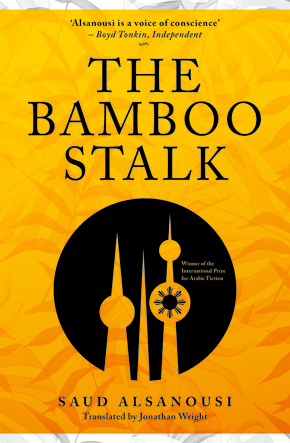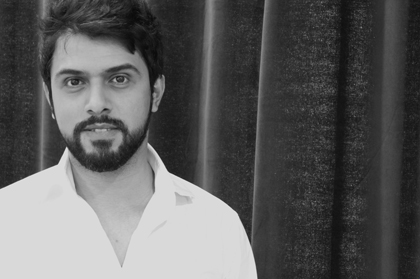Origins
by Saud Alsanousi
“Engrossing, political and heartfelt.” Bidisha
I really loved the piece of land I grew up on. I spent so much time alone there, looking at the things around me, that sometimes I thought I myself was one of the trees that grew there. I didn’t rule out the possibility that my head might sprout leaves or that mangoes might grow behind my ears, or that if I lifted my arms a bunch of bananas would appear under my armpits. Sometimes I imagined myself as a humble pebble on the same piece of land. It might shift position, it might be buried by sand and then the rain might uncover it, but it would stay there, never crossing the bamboo fence that surrounded the land. I loved the green, the colour of life, with all its shades, and in the end I sometimes thought it was the only colour in the universe. And yet, though I loved the green on Mendoza’s land, I hated Mendoza.
Even the land wasn’t spared his greed. He destroyed the only thing of beauty I thought he had created. Despite his greed, there was one thing that had made me see him in a more favourable light – his interest in the land, the trees, his dog Whitey and his gang of cocks. I respected his interest in natural things, even if he didn’t himself take the trouble to look after them. Instead his interest took the form of giving me orders to look after them for him. But when he agreed to let them put up that monstrosity of a tower on the land that I loved, crowding out the trees, I could no longer believe there was a good side to his character.
Often, mostly at night, I would lean my back against the trunk of the biggest tree on Mendoza’s land, with a piece of flat land stretched out in front of me towards Inang Choleng’s house. I would watch everything around me, except for the old woman’s house in case the bee in my head stirred and started buzzing again. In that space I had another life. I would sit on the damp ground. The place would be shrouded in darkness, except for the light that slipped through from the windows of the four houses arranged around me – our house, Mendoza’s house, Uncle Pedro’s house and Inang Choleng’s house.
I don’t know why Mother would be upset that I was sitting under the trees. Perhaps she was worried I would strike roots so deep into the ground that I would never go back to my father’s country.”
The frogs croaking, the crickets chirping, Whitey barking and the other dogs in the neighbourhood barking back, and other noises I couldn’t identify. The noises, coupled with the smell of the earth, would make me want to stay longer. If my mother couldn’t find me at night before she went back to Alberto’s house, she knew I would be sitting under my usual tree. She would open the window and shout, “José! Come on! Come inside!” I would stand up and head back, with a feeling that the trees were bending their branches behind me and trying to grab me. The croaking of the frogs and the buzzing of the insects grew louder, and I sometimes imagined that among all the noises something was calling my name. The weeds caught my feet and made it hard to walk. I wasn’t afraid of leaving these things behind me because I knew I would soon meet them again. By sunset the next day I would have prepared myself to meet my friends again.
As soon as I was home, Aida would comment, “Ah, the Lord Buddha’s back.”
I don’t know why Mother would be upset that I was sitting under the trees. Perhaps she was worried I would strike roots so deep into the ground that I would never go back to my father’s country. But even roots don’t mean much sometimes.
I was more like a bamboo plant, which doesn’t belong anywhere in particular. You can cut off a piece of the stalk and plant it without roots in any piece of ground. Before long the stalk sprouts new roots and starts to grow again in the new ground, with no past, no memory. It doesn’t notice that people have different names for it – kawayan in the Philippines, khaizuran in Kuwait, and bamboo in many places.
Once the relay tower had been put up in the clearing in front of my favourite tree, I began to sit cross-legged on the ground facing in the opposite direction – with my back to the tower and facing the tree trunk. Although I was in a different position, the same sounds still found their way to my ears.
Extracted from The Bamboo Stalk.
 Saud Alsanousi is a Kuwaiti novelist and journalist, born in 1981. He has written for newspapers and magazines including Al-Watan and Al-Arabi and currently writes for the liberal daily Al-Qabas. The Bamboo Stalk is a bold story about social pressures in the Arab world, exploring the rippling repercussions on two continents over two decades after a Filipina maid falls pregnant by the son of a notable Kuwaiti family. An unflinching examination of identity and conscience, it won the 2013 International Prize for Arabic Fiction, and is now is published by Bloomsbury Qatar Foundation Publishing in hardback and eBook, translated by Jonathan Wright. Read more.
Saud Alsanousi is a Kuwaiti novelist and journalist, born in 1981. He has written for newspapers and magazines including Al-Watan and Al-Arabi and currently writes for the liberal daily Al-Qabas. The Bamboo Stalk is a bold story about social pressures in the Arab world, exploring the rippling repercussions on two continents over two decades after a Filipina maid falls pregnant by the son of a notable Kuwaiti family. An unflinching examination of identity and conscience, it won the 2013 International Prize for Arabic Fiction, and is now is published by Bloomsbury Qatar Foundation Publishing in hardback and eBook, translated by Jonathan Wright. Read more.
Jonathan Wright worked for thirty years as a journalist, mostly in the Middle East, before turning to literary translation in 2008. He has since translated a dozen novels and other major works from the Arabic, winning the 2013 Banipal Prize for Arabic Literary Translation for Youssef Ziedan’s Azazeel and the 2014 Independent Foreign Fiction Prize for his translation of Hassan Blasim’s The Iraqi Christ.

